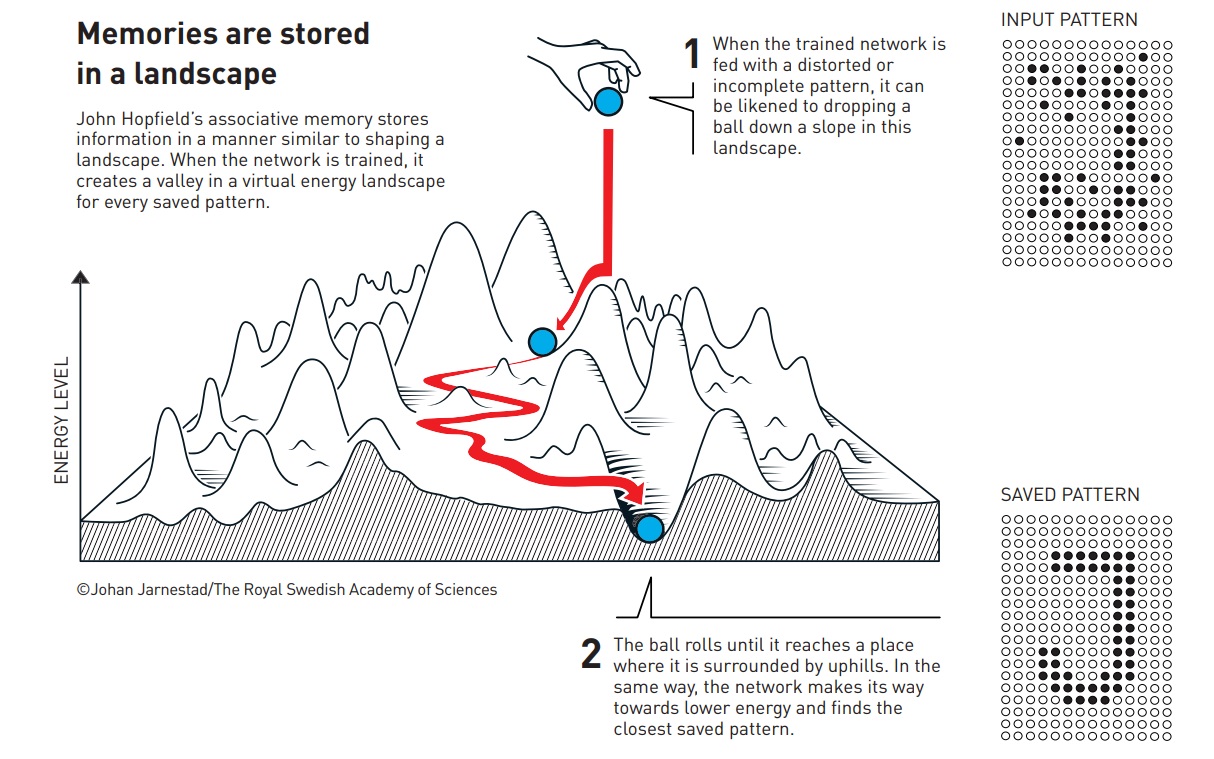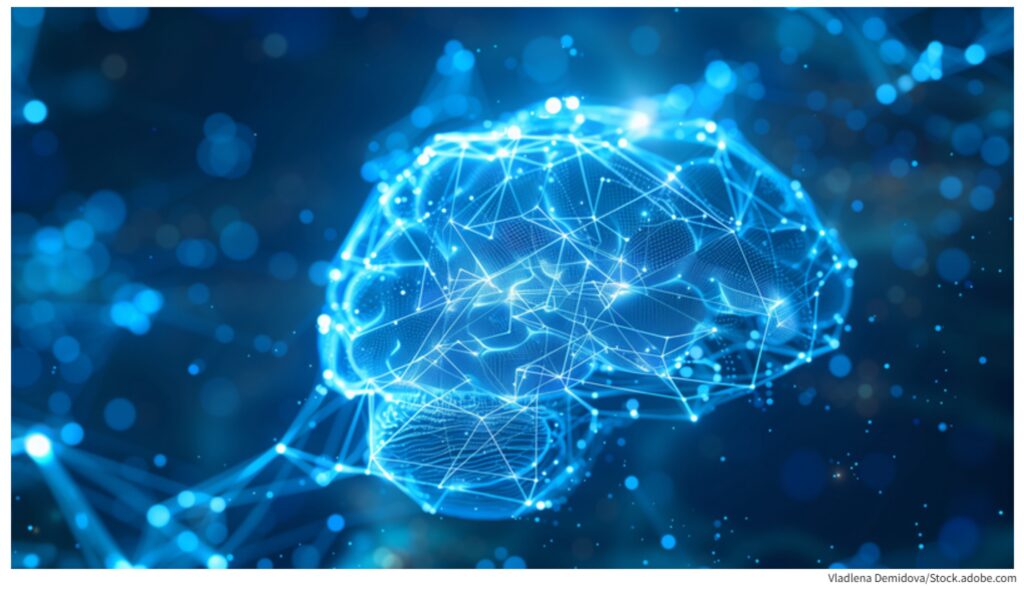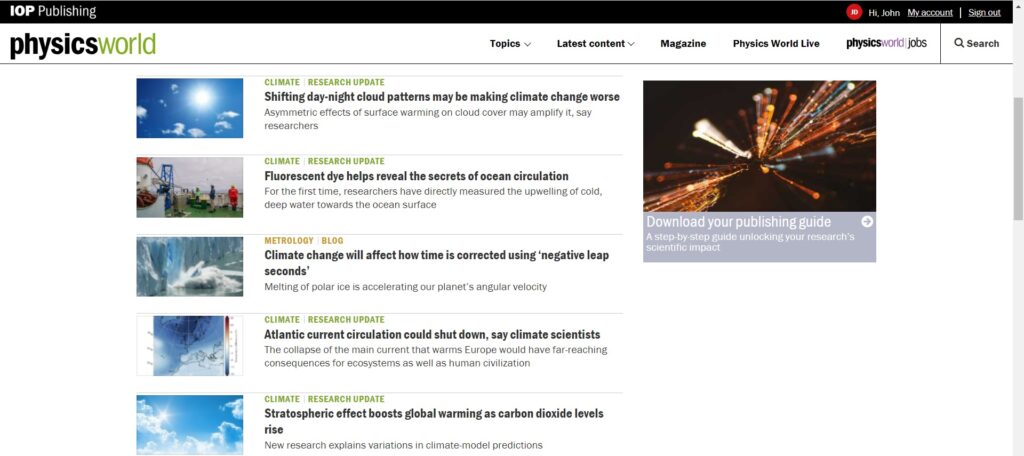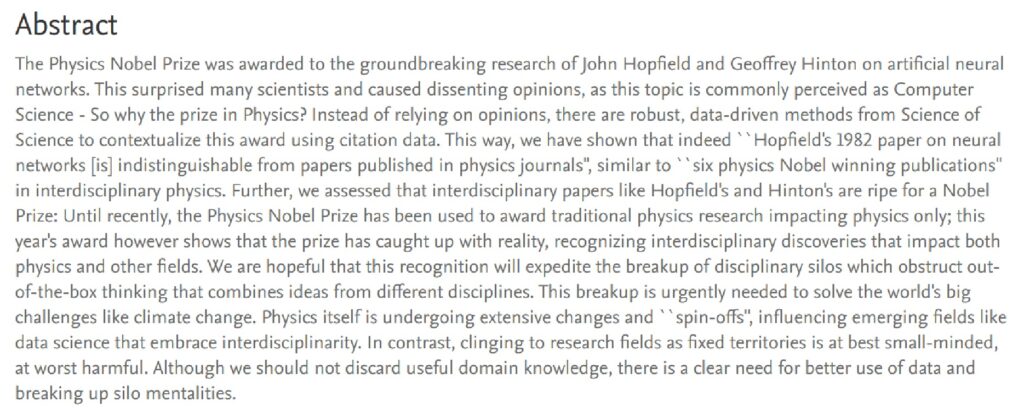This year’s Nobel Prize in Physics was announced on 8th October 2024. I’m writing about it after the event because I wanted to wait for some reaction. If you haven’t already, check out the press release. The prize wasn’t awarded to people who worked on the James Webb Space Telescope. It was awarded to John J Hopfield and Geoffrey Hinton for “foundational discoveries and inventions that enable machine learning with artificial neural networks”. The press release goes on to say “they trained artificial neural networks using physics”. It also says “John Hopfield created an associative memory that can store and reconstruct images and other types of patterns in data”. Then it says “Geoffrey Hinton invented a method that can autonomously find properties in data, and so perform tasks such as identifying specific elements in pictures”. Does that sound like physics to you?
 Image from the Nobel committee’s Popular science background: They used physics to find patterns in information (pdf)
Image from the Nobel committee’s Popular science background: They used physics to find patterns in information (pdf)
Take a look at the Nobel “popular physics” description for some background. There’s a section on associative memory, which is about pattern recognition. It talks about how you might mentally sift through a list of words to recollect a rare word such as the “rake” of a sloping floor in a cinema. It says this activity “is reminiscent of the associative memory that the physicist John Hopfield discovered in 1982. The Hopfield network can store patterns and has a method for recreating them. When the network is given an incomplete or slightly distorted pattern, the method can find the stored pattern that is most similar”. There’s also a section which refers to “statistical physics”, and says this: “Some states are more probable than others; this depends on the amount of available energy, which is described in an equation by the nineteenth-century physicist Ludwig Boltzmann”. It also says “Hinton’s network utilised that equation, and the method was published in 1985 under the striking name of the Boltzmann machine”. That’s the Boltzmann machine, not the bullshit Boltzmann brain which allegedly pops into existence in interstellar space. Anyway, see for example the Brittanica article on Boltzmann, which refers to statistical mechanics and thermodynamics.
The 2024 Nobel prize in physics was awarded for work that was not physics
Note that Hopfield’s work dates from 1982, and Hinton’s work dates from 1985. Something else to note is that Hinton shared the 2018 Turing Award. The Turing award is sometimes called the “Nobel Prize of Computing”, which is a big red flag. They didn’t train artificial networks using physics. It’s popular science not popular physics. It’s statistical mechanics not statistical physics. Their work was in computing, not physics. Despite the Nobel committee trying to insert the word physics left right and centre, the 2024 Nobel prize in physics was awarded for work that was not physics. It was software. Programming. Computing. It was IT work that was done over forty years ago. It wasn’t machine learning because nobody used that phrase back then. It was just pattern recognition.
Machine learning is like outsourcing your business intelligence and your decision making to a computer
I’m unhappy about this. All the more so because I’m an IT guy. I have a degree in Computer Science. I know about machine learning, and I do not like it. Machine learning is like outsourcing your business intelligence and your decision making to a computer. It’s the sort of thing sold to starry-eyed suckers by some smooth-talking TED guy with a headset and an iPad. The sort of guy who talks the trendy talk and paints a rosy future, but ends up fucking up and fucking off. I have similar negative views on AI. There’s been a whole catalogue of AI fails, such as McDonald’s drive-thru ordering that gave customers 260 chicken nuggets plus bacon on their ice cream. Or the Amazon AI recruitment tool that discriminated against women. Or the General Motors bot that sold a Chevy Tahoe for a dollar. Not to mention Google Photos, which called black people gorillas. The list goes on. My heart sinks when I have to use a chatbot. Have you ever tried getting any sense out of an AI system? You really notice the deficiencies when you talk about a precise subject of expertise, such as physics. Then you can spot the waffle, and the regurgitated text of no value. Or absolutely stupid pictures. That’s because the lights are out and there’s nobody home:
 Google Gemini Nazi image See Google apologises for ‘woke’ AI tool on Tech Central
Google Gemini Nazi image See Google apologises for ‘woke’ AI tool on Tech Central
I’ve maybe mentioned it before, but like the lady scientist on the plane at the end of Twelve Monkeys, I’m in insurance. Take a look at an article called The impact of AI on insurance risk. It’s by the Direct Line Group. Sounds great doesn’t it? Now take a look at another article called Direct Line sees return to profit fall short and motor customers quit. They’ve lost nearly half a million customers in a year. Here’s yet another article, dated 11th November 2024: Troubled Direct Line to axe 550 jobs as its boss embarks on a £100m cost-saving programme. They’ll probably end up getting taken over by Aviva. They’ll probably no longer exist. Their Chief Information Officer (CIO) is a guy called Ash Jokhoo. He was hired in 2021, and his greatest preoccupation is “using the latest technologies to serve customers more efficiently”. I don’t know whether he promoted AI at Direct Line, or whether he’s got a headset and an iPad. But I do know that he’s leaving Direct Line at the end of the year.
Let’s put an AI in charge of all our nuclear missiles and automated factories. What could possibly go wrong?
Talking of leaving, Geoffrey Hinton left Google so he could speak freely about the existential risk posed to humanity by AI. I share his sentiments. In fact my opinion of AI has been less than favourable ever since I watched The Terminator in 1984. Hey, let’s put an AI in charge of all our nuclear missiles and automated factories. What could possibly go wrong? People might scoff at the dangers, but one thing I’ve come to appreciate is just how irrational, illogical, and foolish people can be. Especially people who consider themselves to be well-educated and of above-average intelligence. People who occupy positions of power in business, education, and politics. What would happen if somebody created a genuine bona-fide artificial intelligence that had massive servers to process its machinations? The road to hell is paved with good intentions, so I imagine those machinations would feature a directive to save the planet. A directive which resulted in a souped up Thanos solution. So I suspect things wouldn’t work out too well for people:
 Screenshot from the Terminator 2 opening scene, see YouTube
Screenshot from the Terminator 2 opening scene, see YouTube
Hence if I occupied a position of power, I would ban all AI work tomorrow. Not only that, but if I thought somebody was doing AI work in secret, I would send in a SWAT team. We would be talking jail time. I certainly would not encourage it via a Nobel prize. Especially when that Nobel prize was supposed to be for physics as opposed to forty year old pattern recognition.
John Hopfield and Geoffrey Hinton share the 2024 Nobel Prize for Physics
Like I said, I’m unhappy about that. All the more so because some people in the science media are not. See Hamish Johnston’s Physics World article entitled John Hopfield and Geoffrey Hinton share the 2024 Nobel Prize for Physics. Physics World is an Institute of Physics (IOP) magazine. Johnston’s article expresses no surprise that the Nobel prize for physics went to forty year old pattern recognition. Au contraire, he gives a link to another article which says IOP Publishing “publishes many papers in this field and has recently launched the Machine Learning series”. This is said to be “dedicated to the application and development of machine learning (ML) and artificial intelligence (AI) for the sciences”. Oh yeah? How about asking that AI to tell you how gravity works or what charge is or what energy is? It isn’t going to happen is it? Because like another of the science media’s diversion activities, namely quantum computing, it isn’t worth a hill of beans. These people know that there are problems in fundamental physics. However they also know that solving these problems, or even acknowledging them, would rock the boat with journals and institutions that have dug themselves into a hole. If they printed an article saying the electron is a wave in a closed path, like Schrödinger said, Joe Public will work out that charge is topological, which means color charge is bunk. And that electron mass is a measure of resistance to change-in-motion for that wave in a closed path, which means the Higgs mechanism is bunk. Hence they censor the good physics, and peddle bad physics instead.
Nobel Prize: Mimicking Human Intelligence with Neural Networks
Talking of which, I took a look at Quanta Magazine, but couldn’t find an article on the 2024 Nobel prize for physics. Maybe it will turn up. Or maybe they just decided to keep quiet. The APS physics magazine covered it. The article is called Nobel Prize: Mimicking Human Intelligence with Neural Networks, and it was written by Michael Schirber. Again there is no surprise that the Nobel prize for physics went to forty year old pattern recognition. Instead I got the impression that APS physics were quite happy with the situation:
 Image from APS physics, caption: The 2024 physics Nobel laureates developed the earliest forms
Image from APS physics, caption: The 2024 physics Nobel laureates developed the earliest forms
of artficial intelligence (AI) by modeling neurons in the brain. This image was generated by AI.
Ditto for PhysOrg. Their article was Nobel Prize in physics spotlights key breakthroughs in AI revolution – making machines that learn. It originally featured in The Conversation, and was written by Ambuj Tewari, a professor of statistics at the University of Michigan. He sounded as if he was paddling hard to try to justify the work as worthy of a physics Nobel prize, but for me it just didn’t wash. I didn’t like his final sentence either: “By awarding the Nobel Prize in physics to Hopfield and Hinton, the prize committee has signaled its hope in humanity’s potential to use these advances to promote human well-being and to build a sustainable world”. A sustainable world?
They don’t like to mention overpopulation
Sigh. A sustainable world. Climate change is yet another diversion activity for the science media. But like everybody else who bangs on about climate change, they don’t like to mention overpopulation. In 1960 the population of Africa was circa 300 million, now it’s 1500 million, and there’s a whole lot of sub-Saharan slash and burn going on. In similar vein the population of Pakistan has risen from circa 50 million in 1960 to circa 250 million today, and they have a serious pollution problem. So does India, and lots of other countries. All that third world pollution isn’t doing the atmosphere any good. But outlets like Physics World don’t talk about it much:
 Screenshot from Physics World
Screenshot from Physics World
The UK government doesn’t talk about it much either. Just as they don’t talk about the palm oil plantations that are destroying the world’s jungles. They now cover 30 million hectares, which is 115,000 square miles. They don’t want to talk about the contrails either. You know, the contrails that you can see criss-crossing the sky at 39,000ft on a clear still day, adding up to a billion tones of high-altitude aviation emissions a year. Instead they’ll try to tell you that sustainable aviation fuel (SAF) is made out of used cooking oil. They’ll also tell you that you can’t have a gas boiler or a petrol car, but it’s all fine and dandy for an incinerator on Portland to burn two hundred thousand tons of plastic every year. On top of that, they’ll fine you for using your wood-burning stove, but they don’t have a problem with the clear-felling of primal forests to provide Drax B with 6.5 million tonnes of wood pellets per annum.
The idea that artificial intelligence would be related to physics, of all things, might seem far-fetched
But I digress. Sticking to the physics, Peter Woit didn’t mention the 2024 Nobel prize in his Not Even Wrong blog. Matt Strassler didn’t mention it in his Of Particular Significance blog. Sean Carroll didn’t mention it in his preposterous universe blog either. However Ethan Siegel covered it in his starts with a bang blog. He said “the idea that artificial intelligence would be related to physics, of all things, might seem far-fetched on the surface”. Agreed. He also said “Why would a computer science breakthrough, you might ask yourself, be awarded the Nobel Prize in physics?” Quite. But then he tried to justify it. He failed. I thought Sabine Hossenfelder was spot on in her Backreaction blog. See her video entitled The 2024 Nobel Prize in Physics Did Not Go To Physics – This physicist is very surprised. She was unhappy about it too, and she wasn’t the only one. See the Euronews article Is AI physics or chemistry? Nobel Prize wins spark debate about tech’s role in science. It quotes David Vivancos, CEO of the deep learning and AI organisation MindBigData dot com. He says “I am a big admirer of Hinton and Hopfield and they have created a marvellous discovery. But the thing is, it’s not in the realm of physics unless we think that physics is everything”. Well said. For more, see the Harvard Technology Review article called Machine Learning Stirs Controversy in Nobel Prize in Physics. It was written by Nischal Tamang, and the word plagiarism is mentioned. Also see the Reuters article Google’s Nobel prize winners stir debate over AI research by Martin Coulter. He quotes Noah Giansiracusa saying this: “What he did was phenomenal, but was it physics? I don’t think so. Even if there’s inspiration from physics, they’re not developing a new theory in physics or solving a longstanding problem in physics“. Hear hear.
The work falls into the field of computer science
Alternatively take a look at the Nature article entitled AI comes to the Nobels: double win sparks debate about scientific fields. It’s paywalled, but there’s an open access copy on a web site called Portside. It was written by Davide Castelvecchi, Ewen Callaway, and Diana Kwon. They tell us that “moments after the Royal Swedish Academy of Sciences unveiled the winners of this year’s physics Nobel, social media lit up, with several physicists arguing that the science underlying machine learning, celebrated in the awards to Geoffrey Hinton and John Hopfield, was not actually physics”. They quote Imperial College astrophysicist Jonathan Pritchard saying “I’m speechless”, and it’s “hard to see that this is a physics discovery”. They also quote Sabine Hossenfelder saying the work “falls into the field of computer science”. But in addition they quote Matt Strassler being positive about the award. He said this: “Hopfield and Hinton’s research was interdisciplinary, bringing together physics, math, computer science and neuroscience. In that sense, it belongs to all of these fields”. They also quote positive comments from Anil Ananthaswamy, Lenka Zdeborová, and Giorgio Parisi. On balance the article seems to be saying the award was OK. It looks like Nature doubled down on that on 22nd October 2024 with Was the Nobel prize for physics? Yes – not that it matters:
 Screenshot from the IT University of Copenhagen
Screenshot from the IT University of Copenhagen
It was by Michael Szell, Yifang Ma, and Roberta Sinatra, two of whom are in Copenhagen, just across the water from Sweden. Again it’s paywalled but you can find a copy elsewhere. It talks of robust data-driven methods “to contextualize this award using citation data”, and says they have indeed shown that “Hopfield’s 1982 paper on neural networks is indistinguishable from papers published in physics journals”. It also says “we assessed that interdisciplinary papers like Hopfield’s and Hinton’s are ripe for a Nobel Prize”, and that this year’s award “shows that the prize has caught up with reality”. They add that they’re “hopeful that this recognition will expedite the breakup of disciplinary silos”, which is “urgently needed to solve the world’s big challenges like climate change”.
Whatever next? A Nobel peace prize for Hamas?
Oh for fuck’s sake, here we go again. Climate change. The virtue-signalling road-to-hell reverse-Robin racket that takes from the poor and gives to the rich. We now have no natural gas storage in the UK, so we pay spot prices, so our retail prices have quadrupled. Natural gas is now four times as expensive in the UK as it is in the USA. And guess what? The price of electricity is tied to the price of natural gas. Even when it’s generated from renewables. Hence a lot of people can’t afford to heat their homes. I really feel for them, because our natural gas boiler was out of action for three weeks until yesterday. The cold was debilitating. Life was miserable until I put an electric heater in every room. God knows what that’s going to cost. Meanwhile high energy prices are killing UK industry. Steel production will be ending in the UK soon. Don’t believe what they say about electric arc smelting, because the electricity will be too expensive, just as it’s too expensive for aluminium smelting. In addition Vauxhall have just announced the closure of their Luton car plant. I’m with Billy Bob Thornton on this. Net zero is making us poor, and our current and previous governments just don’t care. Nor does the science media. It censors any criticism of climate change. Not only that, it censors the physics that could make a difference. Hence I’m more than unhappy. Especially since a half share of the 2024 Nobel prize for chemistry was awarded to Demis Hassabis and John Jumper of Google DeepMind, for an AI called AlphaFold2. Not only that, but UNRWA were nominated for the Nobel peace prize, which, apparently, is becoming a sick joke. The winner warned Israel against using nuclear bombs in Gaza. Whatever next? A Nobel peace prize for Hamas? Sigh. All the Nobel prizes are becoming a sick joke. Not just the 2013 physics prize for a kludge that contradicts E=mc² and sets bad science in stone. Not just the 2021 physics prize which was actually for climate change. Not just the 2022 prize for quantum entanglement which is just Malus’s law in disguise. Sigh. I’ve said it before and I’ll say it again: Alfred Nobel caused far more harm with his prizes than he ever did with his dynamite.
Drax B immediately reminded me Pink Floyd’s “Animals” L.P. and the real life British power stations incorporated into the artwork.
Time to start stocking up for a real life apocalyptic future, simular G.O.T.’s Long Winter ……..
The power station on the front of the album cover is Battersea power station in London. I went past it in a fastcat ferry about three months ago. It’s now a shopping centre, surrounded by fancy apartment blocks.
.
Ah, Game of Thrones. I think they got the long winter idea from the Brian Aldiss book Helliconia Winter. I have it somewhere on my bookshelf. There’s a series of them, they’re good. Yes, I am definitely getting some prepper vibes now, and thinking about what I can do to prepare for power cuts. By the by, I was on holiday in Tenerife a month ago, and found myself noticing just how many houses had bars on the windows. We tend not to have them in the UK. Not yet, anyway.
In other news, there was an item in the paper today about extending the life of UK nuclear power stations. See this for example: https://ca.news.yahoo.com/lifespan-four-nuclear-power-stations-230019580.html. I fear we are headed for power cuts here in England. The sort you get in “failed states”. Sigh. If it does happen, thank your lucky stars that it isn’t happening to you because of you-know-who.
Sir Detective,
Point taken on overpopulation (“Regular readers know that this series is based on civilization’s blindness to the consequences of improper use and pollution of the resources of the Earth, exacerbated by overpopulation.” – The Peak of Sanity – 6, Dredd Blog, 2013).
I do think physics is one realm that can enlighten many paths to solutions of many sorts (The Photon Current – 19).
Finally, I totally agree with you that “This year’s Nobel Prize in Physics” was a gross error.
Thanks Dredd. Re the vacuum energy problem, it’s total bollocks based upon a total lack of understanding. See https://en.wikipedia.org/wiki/Vacuum_energy and note this: “Vacuum energy can also be thought of in terms of virtual particles (also known as vacuum fluctuations) which are created and destroyed out of the vacuum. These particles are always created out of the vacuum in particle–antiparticle pairs, which in most cases shortly annihilate each other and disappear. However, these particles and antiparticles may interact with others before disappearing, a process which can be mapped using Feynman diagrams. Note that this method of computing vacuum energy is mathematically equivalent to having a quantum harmonic oscillator at each point and, therefore, suffers the same renormalization problems. Virtual particles are virtual. As in not real. They do not exist. Renormalization problems only exist because the Copenhagen School adopted Yakov Frenkel’s point-particle electron to spite the realists like de Broglie, Schrödinger, Darwin, and Einstein. Have a read of some of the historical articles here: https://physicsdetective.com/articles/historical-articles/. It’s a horrible history, and here we are a hundred years later still saddled with the “you can never hope to understand it” legacy.
If that is the case, then how do we explain the Casimir Effect?
Christian,
“how do we explain the Casimir Effect?”
LSD (The Ghost Photons – 5)
Christian: it’s as per the force between two moored ships. It’s very weak, and results from the way that the chaotic ripples on the surface of the sea are different between two ships. The point to note is that the equivalent in space is called vacuum energy, but it isn’t the same things as spatial energy, such as the energy of the gravitational field which “acts gravitatively in the same way as any other kind of energy”. IMHO the Casimir effect is caused by something akin to ripples on the surface of the sea, but vacuum or spatial energy is more like the sea itself. See https://physicsdetective.com/what-energy-is/.
I didnt know where to address this, so i write it here as a comment… are you aware of the works of Vivian Robinson? It seems very similar to how you describe things. Would be interesting to hear your opinion!
Marty: yes, he’s a member of quicycle, founded by Williamson and van der Mark. See for example https://quicycle.com/ where you can read this: “According to the Robinson model, not only the electron but all stable subatomic particles are composed of an internal photon of the appropriate energy that completes two revolutions per wavelength. (See Vivian Robinson: The Common Sense Universe)”. Whilst I’ve been doing the physics detective, I haven’t put much time into talking to like-minded people. However I now have more free time, so I expect I will in future.
Earlier Nobel Prizes related to Cosmology may be coming into some question. “The Dark Energy model of the universe, which won a Nobel Prize in 2011, may be completely wrong.” … https://x.com/Andercot/status/1870985287016563189
Thanks Dredd. I see it: https://arxiv.org/abs/2412.15143. I note that their timescape cosmology “replaces dark energy by kinetic gravitational energy”. I’m not too keen on that. It’s space that’s expanding, and IMHO the energy of this expanding space is not kinetic, and nor is gravitational field energy. But maybe it’s me, and I need to read it properly. Meanwhile it’s good to see some publicity for something that challenges ΛCDM, which is wrong on multiple counts. I had a look around and found this article, which is a nice summary. I also had a look at Wiltshire’s website: http://www2.phys.canterbury.ac.nz/~dlw24/. His CV looks impressive, but it looks like he doesn’t know that a gravitational field is a place where space is “neither inhomogeneous nor isotropic”. That’s odd.
Thanks Sir Detective for the links and analysis. I think that the misunderstanding that “the speed of light is a constant” is at the root of many falsified hypotheses. It is in fact only constant in a context. But contexts can change. I program in C++ and the speed of light is constant only in a context. If the context changes then so can the speed of light. But it is not arbitrary changing mysteriously in a context to another speed without explanation. But I digress 😉 …
Time for me to handicap the 2025 Swedish Fish Dyn-O-Myte Award for supposed physics. As usual, my best guess is based on 2025’s Breakthrough Awards: Gerard t’ Hooft was granted a Life Time Achieve Award, KUDOS!
The regular award cash was evenly distributed amongst appx. 13,000.people !
So will 13,000. individual “Winner! Winner! Free Chicken Dinners!” sit with the King??
My prediction is : S.O.S for the Gold, S.N.A F.U. for the Silver, and F.U.B.A.R placiing Bronze for the trifecta.
It never fails to disappoint Greg. Prizes are now part of the problem. They set bad science in stone.
“AIP is excited to congratulate John Clarke, Michel H. Devoret, John M. Martinis who were awarded the 2025 Nobel Prize in Physics “for the discovery of macroscopic quantum mechanical tunnelling and energy quantisation in an electric circuit.” This incredible achievement highlights the power of quantum mechanics to govern not only the behavior of a single electron, but also the collective motion of billions of them acting together in a single circuit.”
I am pleasantly pleased to eat some Crow ; I actually am modestly pleased by this year’s choice of Clarke, Devoret, and Martinis. My low level research indicates their work is basically an extention of the 1973 Winners of Josephson(S.I.unit Josephson Joints), Esaki(Sony semi-conductors) and Gaiever. The work of the 2025 winners for Chemistry seems progressive as well.
All point to a Classical Maxwellian interpretation of Q.M..
Hardy, Har, Har !
https://www.ladbible.com/news/us-news/donald-trump-nobel-peace-prize-reason-lost-332013-20251010
The actual, most deserving winner !
https://www.alternet.org/trump-nobel-rubio/
I think it’s too early anyway Greg. If the peace holds, then maybe he deserves it. But I doubt that it will.